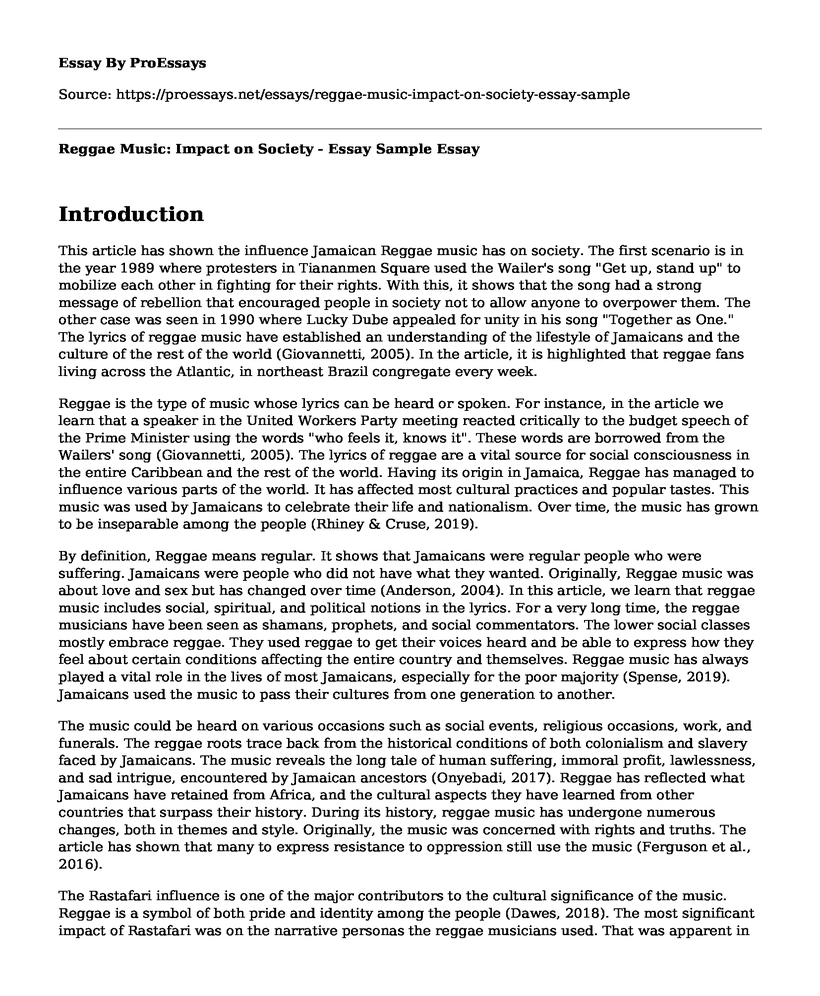Introduction
This article has shown the influence Jamaican Reggae music has on society. The first scenario is in the year 1989 where protesters in Tiananmen Square used the Wailer's song "Get up, stand up" to mobilize each other in fighting for their rights. With this, it shows that the song had a strong message of rebellion that encouraged people in society not to allow anyone to overpower them. The other case was seen in 1990 where Lucky Dube appealed for unity in his song "Together as One." The lyrics of reggae music have established an understanding of the lifestyle of Jamaicans and the culture of the rest of the world (Giovannetti, 2005). In the article, it is highlighted that reggae fans living across the Atlantic, in northeast Brazil congregate every week.
Reggae is the type of music whose lyrics can be heard or spoken. For instance, in the article we learn that a speaker in the United Workers Party meeting reacted critically to the budget speech of the Prime Minister using the words "who feels it, knows it". These words are borrowed from the Wailers' song (Giovannetti, 2005). The lyrics of reggae are a vital source for social consciousness in the entire Caribbean and the rest of the world. Having its origin in Jamaica, Reggae has managed to influence various parts of the world. It has affected most cultural practices and popular tastes. This music was used by Jamaicans to celebrate their life and nationalism. Over time, the music has grown to be inseparable among the people (Rhiney & Cruse, 2019).
By definition, Reggae means regular. It shows that Jamaicans were regular people who were suffering. Jamaicans were people who did not have what they wanted. Originally, Reggae music was about love and sex but has changed over time (Anderson, 2004). In this article, we learn that reggae music includes social, spiritual, and political notions in the lyrics. For a very long time, the reggae musicians have been seen as shamans, prophets, and social commentators. The lower social classes mostly embrace reggae. They used reggae to get their voices heard and be able to express how they feel about certain conditions affecting the entire country and themselves. Reggae music has always played a vital role in the lives of most Jamaicans, especially for the poor majority (Spense, 2019). Jamaicans used the music to pass their cultures from one generation to another.
The music could be heard on various occasions such as social events, religious occasions, work, and funerals. The reggae roots trace back from the historical conditions of both colonialism and slavery faced by Jamaicans. The music reveals the long tale of human suffering, immoral profit, lawlessness, and sad intrigue, encountered by Jamaican ancestors (Onyebadi, 2017). Reggae has reflected what Jamaicans have retained from Africa, and the cultural aspects they have learned from other countries that surpass their history. During its history, reggae music has undergone numerous changes, both in themes and style. Originally, the music was concerned with rights and truths. The article has shown that many to express resistance to oppression still use the music (Ferguson et al., 2016).
The Rastafari influence is one of the major contributors to the cultural significance of the music. Reggae is a symbol of both pride and identity among the people (Dawes, 2018). The most significant impact of Rastafari was on the narrative personas the reggae musicians used. That was apparent in the lyrics, performances, and lives of the artists. Reggae has become more than just entertaining and transformed to be a medium for social and political remarks (Ferguson et al., 2016). During the colonial period, the music became a threat to the Jamaican government by awakening the Jamaicans to a new age of consciousness. Reggae music has been used as protest music, evaluating the outcomes of political and social injustices that took place during the period (Dawes, 2018).
References
Anderson, R. (2004). Reggae music: a history and selective discography. Notes, 61(1), 206-214.
Dawes, K. (2018). Sound Systems: A new generation of Jamaican musicians is blending dancehall and roots reggae to take on the country's problems. World Policy Journal, 35(1), 35-39.
Ferguson, G. M., Boer, D., Fischer, R., Hanke, K., Ferreira, M. C., Gouveia, V. V., ... & Adams,
B. G. (2016). "Get Up, Stand Up, Stand Up for Your Rights!" The Jamaicanization of Youth Across 11 Countries Through Reggae Music?. Journal of Cross-Cultural Psychology, 47(4), 581-604.
Giovannetti, J. L. (2005). Jamaican reggae and the articulation of social and historical consciousness in musical discourse.
Onyebadi, U. (2017). Bob Marley: Communicating Africa's political liberation and unity through reggae music. International Communication Research Journal, 52(1), 56-79.
Rhiney, K., & Cruse, R. (2019). Placing the Music: Kingston, Reggae Music, and the Rise of a Popular Culture. In Sounds and the City (pp. 55-75). Palgrave Macmillan, Cham.
Spence, K. M. (2019). When Money is not Enough: Reggae, Dancehall, and Policy in Jamaica. The Journal of Arts Management, Law, and Society, 49(1), 45-60.
Cite this page
Reggae Music: Impact on Society - Essay Sample. (2023, Mar 13). Retrieved from https://proessays.net/essays/reggae-music-impact-on-society-essay-sample
If you are the original author of this essay and no longer wish to have it published on the ProEssays website, please click below to request its removal:
- Essay Example on Prominent Travel Photographers
- The Impact of Social Media on Depression Annotated Bibliography Paper Example
- Representation of LGBT in Arab Cinema - Essay Sample
- Assignment Example on German Romanticism
- Movie Analysis Essay on "The Martian"
- Essay Sample on Traditional News vs. New Media: Biasness and Accuracy
- Marriage Story - Free Movie Review Sample







